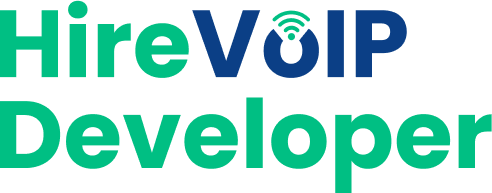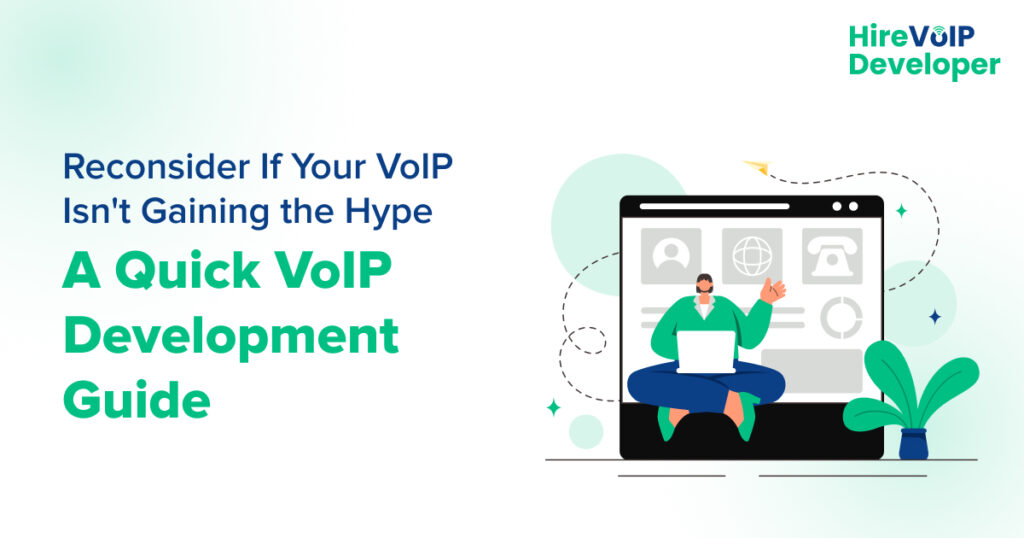Technological advancements have transformed the way we communicate and connect with the world. Modern digital communication, driven by advancements in VoIP Development, enables people to connect over the Internet without compromising network availability. You can connect to any VoIP-integrated device or a traditional phone with a VoIP softphone.
But What Makes VoIP a Must-Have Option?
VoIP (Voice over Internet Protocol) converts analog signals into data packets, allowing you to call and connect over the Internet. A VoIP system is your one-stop solution for lowering high-cost bills while connecting with long-distance or international networks. It provides advanced features like video conferencing, call forwarding, and voicemail-to-mail.
Significance of Having a VoIP System for Businesses
A VoIP network system can save you up to 45-50% on bills, which justifies their widespread adoption by businesses and enterprises.
VoIP is a cost-efficient and scalable solution, but this is the exact phrase we have been listening to for so long.
What’s new? We are following the latest trends in communication technology, such as Interactive Voice Response (IVR) and CRM, implementing an AI-integrated communication network, using Machine learning to recognize similar patterns in customer sentiments and emotions, and
Key Points to Consider While Implementing VoIP Software Developer for Your Businesses
A successful VoIP system should have the following key features to consider for your business growth.
- SIP Trunking – SIP trunking is a technology that allows you to make or receive calls or multimedia messages online. The abbreviation SIP stands for Session Initiation Protocol, which means to initiate, maintain, or terminate communication sessions. “Trunking” refers to the virtual phone line connecting the two end networks.
- Codecs – To enable efficient transfers, Codecs compress and decompress shared data, be it calls or any multimedia message, reducing bandwidth and delivering jitter- and buffer-free communication.
- Session Border Controller – Session Border Controllers (SBCs) are deployed in any communication network to secure and regulate IP communication flow in VoIP or Unified Communication solutions.
- Cloud Hosted PBX – A hosted PBX is a virtual private branch exchange hosted by a service provider, which means the servers are managed and maintained by the third-party provider.
- IVR-CRM – A communication network with tools like CRM and customized IVR solutions that help manage customer relationships and helpdesk software.
Build Smarter, Faster, and Scalable VoIP Solutions!
The Expert VoIP Developers of 2024`
- Ecosmob – Customizable, scalable VoIP solutions using cutting-edge technologies
- RingCentral – High-quality VoIP service, comprehensive plans
- Nextiva – HIPAA-compliant solutions, secure VoIP phone service
- Grasshopper – Tailored for small businesses, scalable plans
- CallHippo – Quick setup, integration with popular CRMs and tools
| Providers | Features | Solutions Offered | Unique Aspects |
| Ecosmob | A custom, scalable VoIP solution using advanced technologies. | Session Border Controller, Hosted PBX, Wholesale/Retail VoIP Switch, Unified Communication, IVR, Broadcasting, MVNO, Contact Center, Conferencing, Fax over IP, Telepresence. | Extensive expertise in Open Source telephony development |
| RingCentral | High-quality VoIP service, comprehensive plans | Internet Fax, Voice Text, Video conferencing, advanced call routing and call forwarding alerts | Unlimited calls within the US and Canada |
| Nextiva | HIPAA-compliant solutions, secure VoIP phone service | HD VoIP Phone Service, Business Texting, Online Faxing, Advanced Call Routing, Conference Bridge, Caller ID, Auto-attendant, Voicemail to email, Call queuing, Unlimited calling | Video calling feature available with all plans |
| Grasshopper | Tailored for small businesses, scalable plans | Voicemail transcription, call-forwarding, mobile/desktop apps, simultaneous call handling, custom greetings, business texting, virtual fax, instant response | 7-day free trial, personalized messages |
| CallHippo | Quick setup, integration with popular CRMs and tools | HD voice calling, audio conferencing, auto-attendant, IVR, power dialer, intelligent calling routing, call distribution, analytics, call monitoring, warm transfer, live call monitoring | Easy setup and use, high-quality transcriptions |
Testing and Deployment Approach
Creating a prototype system allows your team to test the features, configurations, and vulnerabilities without affecting day-to-day operations.
- Call Quality – Test the call quality for any VoIP by rating it on a scale of 1 to 5, where 1 is considered the optimum score, and 5 is the minimum score.
- Latency – Latency in receiving data packets is when the data packet was sent and the time it was received couldn’t be more than 150 milliseconds.
- Jitter and Packet Loss – Jitter or packet loss is choppy or fragmented audio that often leads to failed delivery to the destination and missing important information.
Once the prototype passes the necessary tests, the system is ready for full-scale deployment. The deployment process needs to be carefully planned so as not to interrupt the business’s ongoing workflow and operations.
Conclusion
Choosing the right VoIP developer is essential to the success of your business communication strategy. Focus on the developer’s technical expertise, specialization, and ability to provide long-term support. Take your time to consider your business and enterprise’s needs and requirements, and find a VoIP solution that is secure, scalable, customizable, and affordable.
We at Hire VoIP Developer are an expert VoIP development company that offers comprehensive services. We help businesses implement and maintain robust VoIP solutions. Choosing us as your VoIP developer can provide various benefits tailored to specific business needs.


